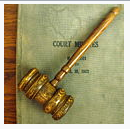
In 1997, H.L. both created and acted as the trustee of his own irrevocable trust until 2008, when his daughter L.L. assumed the role. H.L. died on January 27, 2012. The trust required that it be used for his benefit during his life, and then special bequests of $25,000 each be given to his three grandchildren. It also instructed that the remainder of the trust be equally divided among his three daughters. His estate also included a Brooklyn co-op.
L.L’s sister P.K. repeatedly requested a release of information about the Trust, and access to the co-op. P.K. went to court and claimed that her sister abused her position as trustee and used the trusts assets for her own benefit. She also requested damages and L.L’s removal and P.K’s appointment as trustee.
To support this, she hired a forensic accountant who reported to the court that L.L had – in fact – used the trust for her own benefit while her father was in the hospital. She gave no rebuttal, and the judge found she made unexplained loans/withdrawals in the amount of $22,179.25 and “impermissibly paid a $10,000 retainer to the attorney” she hired to defend the lawsuit. In addition, the judge found she improperly paid expenses on her father’s co-op “even though she knew he was not ambulatory and would never return to the home.” This accounted for another $29,800.88 in improper trust fund charges.
The lower court judge entered a judgment against L.L. in the amount of $149,342.63. He also ordered that she pay accounting, attorneys and other fees caused by the litigation. Finally, P.K. was appointed as trustee.
On appeal, L.L tried to persuade the higher court that the judge made numerous mistakes and that the expert testimony was incorrect on several grounds. But the facts were well established that the trust was improperly managed by L.L. Under the law, “A trustee’s fiduciary relationship is based on the utmost trust,” and there is a “most fundamental duty of loyalty to the trust’s beneficiaries.” In this case, L.L. should have sold the co-op several years ago to maximize funds available to the beneficiaries.
P.K.’s expert’s conclusions were well supported, and L.L. failed to refute any of them. Her remaining contentions that the counsel and other fees, the interest on the judgment, and other calculation were improper were dismissed. The appeals court found that the lower court correctly calculated each element, the expert testimony was sound and not refuted when it could have been, and that L.L. was properly removed from her position as trustee for these abuses of her role.
Under N.J. trustee/beneficiary laws, the fiduciary responsibility of the trustee is incredibly (and rightfully so) high. Trusts are often extremely complex, difficult vehicles to administer and often require requisite legal and financial knowledge. In fact, it is quite common for attorneys to be appointed as trustees to prevent the kinds of abuses that took place here. Someone who isn’t knowledgeable can make even accidental or unknowing breaches his or her legal duties. Evan Xavier Bakhet is a J.D. Candidate at Rutgers School of Law-Newark with a scheduled graduation date in 2017. He collaborated with me on this blog.

